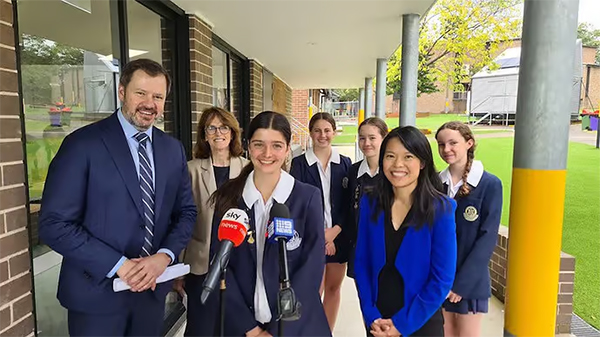A teacher on a school excursion to Ricketts Point Marine Sanctuary, Port Phillip Bay, Victoria, Australia. / Credit: Jason Edwards / Getty Images.
Petra Stock, Consultation begins on national science vision and priorities refresh, Cosmos, 23 February 2023
Science Minister Ed Husic encourages everyone to get involved in the conversation.
2017. The year Donald Trump was inaugurated US President, tweeted “covfefe” and met Pikotaro, performer of the viral hit Pen-Pineapple-Apple-Pen.
It was also the year Australia last published a National Science Statement, setting out the government’s vision for an “Australian society engaged in and enriched by science”.
In that time, science has shifted dramatically, along with society’s biggest challenges – from the global pandemic and international affairs, to the accelerating impacts of climate change and the emergence of new technologies. And with a new government comes new policy and direction.
That’s why in September last year Industry and Science Minister Ed Husic announced the Australian Government would refresh the national statement along with its science and research priorities.

On Thursday, Minister Husic officially opens what he describes as “a national conversation” on Australia’s science priorities and vision.
“With our scientific knowledge constantly evolving and improving, a science system geared to our future is essential for our national prosperity and the well-being of the Australian people,” Husic says.
“We want to hear the views of a wide range of Australians on the issues they are facing that require a solution drawing on the breadth of our science and research communities.”
Australia’s Chief Scientist, Dr Cathy Foley is tasked with leading the engagement effort.
“We want to ensure we can tackle the big challenges – and that means supporting a strong and energetic research sector and a real sense of collective focus,” Foley says.
She will be conducting a series of roundtables with a broad cross section of the Australian community.
Kylie Walker, CEO of the Australian Academy of Technological Science & Engineering says the organisation is looking forward to joining the national conversation on science and research.
“Australia’s facing complex challenges now, and in the future – and it’s vital that we understand our nation’s opportunities and strengths, and focus STEM research and translation to best build resilience, meet these challenges, and take advantage of the opportunities they present,” she says.
Australia’s research strength is dependent on our international collaborations, Walker says.
“Our national priorities must recognise these connections, and be established alongside global issues including the United Nations Sustainable Development Goals. We must also recognise and foster collaborative research within Australia, including respectful partnership with Traditional Knowledge systems. We’re keen to see Traditional Knowledge as a priority for Australian STEM going forward.”
Ryan Winn, CEO of the Australian Council of Learned Academies says, “it is important that the final priorities rise above research disciplines and focus on the nature of issues that science and research need to assist.”
“It will be through the combination of interdisciplinary insights that we will develop the solutions to complex issues and develop truly breakthrough technologies useful to society and industry.”
Meanwhile, a significant challenge Australia will face in realising any new scientific and research vision is the dearth of science teachers, according to the Australian Science Teachers Association.
The organisation says up to 40% of teachers could be teaching outside of their subject area, and it has heard of examples such as first year graduates teaching year 12 physics.
“If we are to genuinely invest in our scientific and research priorities of the future, we must address this gap, without doing so as a nation we will fail at building our scientific capabilities and skills. In the National Science Statement we hope to see greater recognition of the Science Teaching profession and investment in tackling the science teacher shortage above and beyond what is proposed within the Teacher Workforce Action Plan,” a spokesperson for the association says.
The government has launched an online portal and is inviting views on Australia’s greatest national challenges, opportunities and strengths.
The first phase of engagement closes on 31 March 2023, with more opportunities becoming available in the months ahead. The process is expected to be finalised by September.
See also: Australia’s science and research priorities: conversation starter

